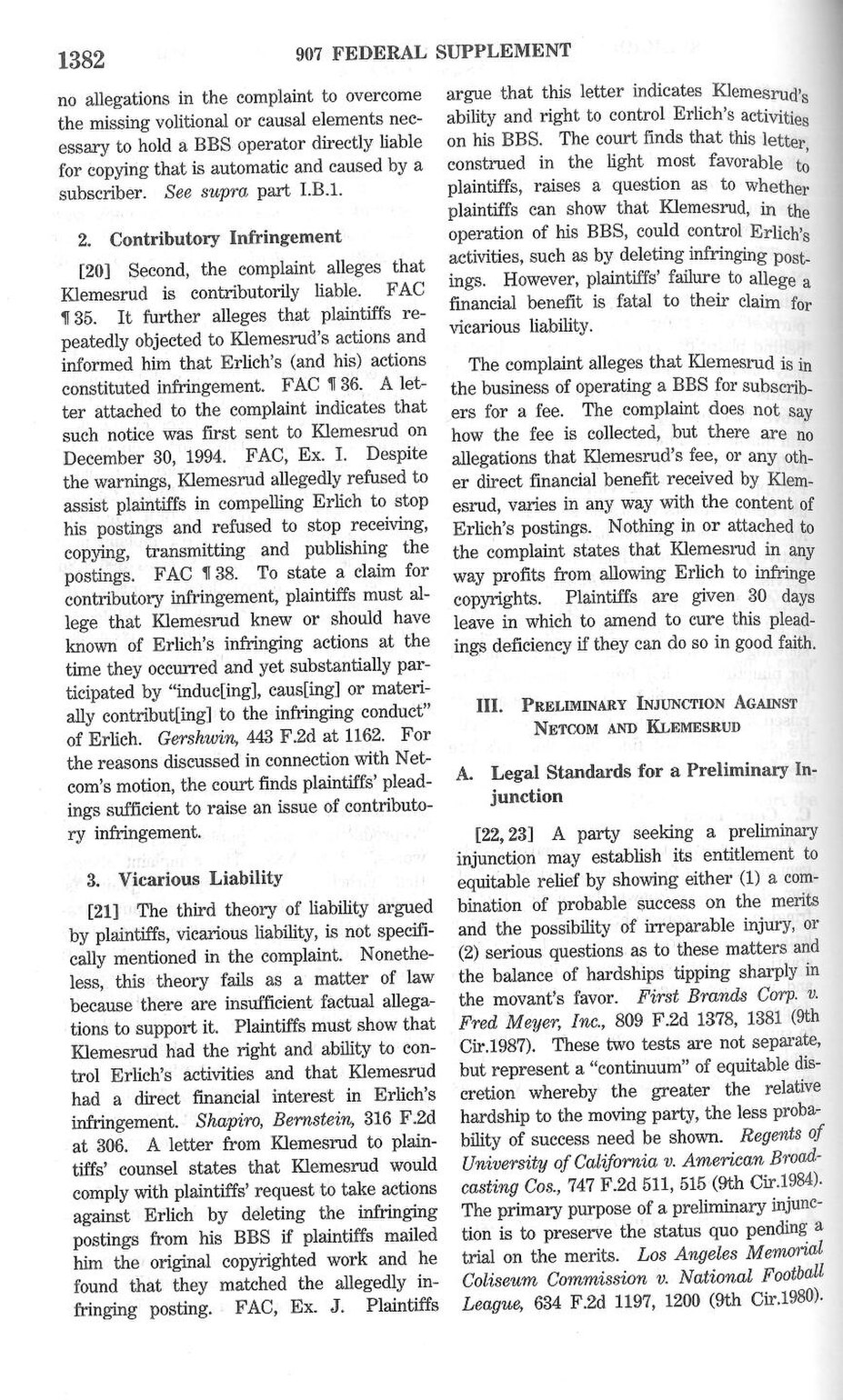no allegations in the complaint to overcome the missing volitional or causal elements necessary to hold a BBS operator directly liable for copying that is automatic and caused by a subscriber. See supra part I.B.1.
- 2. Contributory Infringement
Second, the complaint alleges that Klemesrud is contributorily liable. FAC ¶ 35. It further alleges that plaintiffs repeatedly objected to Klemesrud’s actions and informed him that Erlich’s (and his) actions constituted infringement. FAC ¶ 36. A letter attached to the complaint indicates that such notice was first sent to Klemesrud on December 30, 1994. FAC, Ex. I. Despite the warnings, Klemesrud allegedly refused to assist plaintiffs in compelling Erlich to stop his postings and refused to stop receiving, copying, transmitting and publishing the postings. FAC ¶ 38. To state a claim for contributory infringement, plaintiffs must allege that Klemesrud knew or should have known of Erlich’s infringing actions at the time they occurred and yet substantially participated by “induc[ing], caus[ing] or materially contribut[ing] to the infringing conduct” of Erlich. Gershwin, 443 F.2d at 1162. For the reasons discussed in connection with Netcom’s motion, the court finds plaintiffs’ pleadings sufficient to raise an issue of contributory infringement.
- 3. Vicarious Liability
The third theory of liability argued by plaintiffs, vicarious liability, is not specifically mentioned in the complaint. Nonetheless, this theory fails as a matter of law because there are insufficient factual allegations to support it. Plaintiffs must show that Klemesrud had the right and ability to control Erlich’s activities and that Klemesrud had a direct financial interest in Erlich’s infringement. Shapiro, Bernstein, 316 F.2d at 306. A letter from Klemesrud to plaintiffs’ counsel states that Klemesrud would comply with plaintiffs’ request to take actions against Erlich by deleting the infringing postings from his BBS if plaintiffs mailed him the original copyrighted work and he found that they matched the allegedly infringing posting. FAC, Ex. J. Plaintiffs argue that this letter indicates Klemesrud’s ability and right to control Erlich’s activities on his BBS. The court finds that this letter, construed in the light most favorable to plaintiffs, raises a question as to whether plaintiffs can show that Klemesrud, in the operation of his BBS, could control Erlich’s activities, such as by deleting infringing postings. However, plaintiffs’ failure to allege a financial benefit is fatal to their claim for vicarious liability.
The complaint alleges that Klemesrud is in the business of operating a BBS for subscribers for a fee. The complaint does not say how the fee is collected, but there are no allegations that Klemesrud’s fee, or any other direct financial benefit received by Klemesrud, varies in any way with the content of Erlich’s postings. Nothing in or attached to the complaint states that Klemesrud in any way profits from allowing Erlich to infringe copyrights. Plaintiffs are given 30 days leave in which to amend to cure this pleadings deficiency if they can do so in good faith.
III. Preliminary Injunction Against Netcom and Klemesrud
A. Legal Standards for a Preliminary Injunction
A party seeking a preliminary injunction may establish its entitlement to equitable relief by showing either (1) a combination of probable success on the merits and the possibility of irreparable injury, or (2) serious questions as to these matters and the balance of hardships tipping sharply in the movant’s favor. First Brands Corp. v. Fred Meyer, Inc., 809 F.2d 1378, 1381 (9th Cir.1987). These two tests are not separate, but represent a “continuum” of equitable discretion whereby the greater the relative hardship to the moving party, the less probability of success need be shown. Regents of University of California v. American Broadcasting Cos., 747 F.2d 511, 515 (9th Cir.1984). The primary purpose of a preliminary injunction is to preserve the status quo pending a trial on the merits. Los Angeles Memorial Coliseum Commission v. National Football League, 634 F.2d 1197, 1200 (9th Cir.1980).
